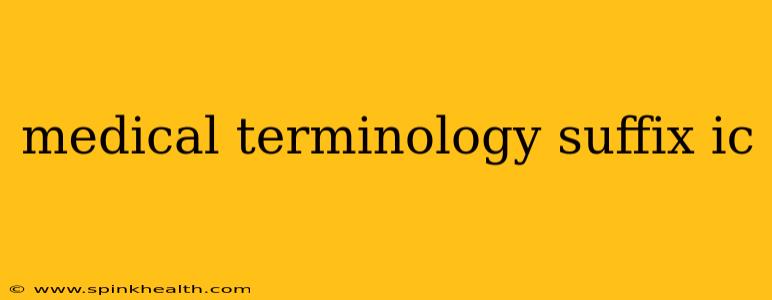Decoding the Medical Mystery: Understanding the Suffix "-ic"
Have you ever encountered a medical term ending in "-ic" and felt a wave of confusion wash over you? You're not alone! Medical terminology can feel like a secret code, but with a little understanding, you can decipher even the most complex terms. This journey into the world of medical suffixes begins with the common and versatile "-ic." This seemingly simple suffix holds a key to understanding a vast array of medical conditions and processes.
Let's embark on a storytelling adventure to uncover the secrets hidden within "-ic." Imagine yourself as a medical detective, armed with knowledge and ready to crack the code of medical language. Our first case involves the suffix "-ic," which often indicates an adjective describing a condition, quality, or relationship. It signifies "pertaining to," "relating to," or "characteristic of."
What does the suffix -ic mean in medical terms?
The suffix "-ic" is a powerful tool in medical terminology. It transforms nouns into adjectives, creating words that describe a specific attribute or condition. For example, "card" becomes "cardiac" (pertaining to the heart), "psych" becomes "psychic" (pertaining to the mind), and "tox" becomes "toxic" (pertaining to poison).
In medical settings, this means "-ic" often points to:
- The nature of a disease or condition: Think "hepatic," referring to the liver, or "gastric," referring to the stomach. The suffix instantly tells us which organ system the condition affects.
- The type of tissue or cell: "Epithelial" describes the tissue that lines cavities and surfaces.
- A specific substance or process: "Glycemic" refers to blood sugar levels.
Think of "-ic" as a versatile detective's magnifying glass, zeroing in on the specific aspect of a medical term.
What are some examples of medical terms ending in -ic?
Let's delve into some real-world examples to solidify our understanding. Consider these common terms:
- Cardiac: Pertaining to the heart. A cardiac arrest is a cessation of heart function.
- Gastric: Pertaining to the stomach. Gastric ulcers are sores in the stomach lining.
- Hepatic: Pertaining to the liver. Hepatic disease encompasses various liver conditions.
- Pulmonic: Pertaining to the lungs. Pulmonic stenosis is a narrowing of the pulmonary valve.
- Toxic: Pertaining to poison or harmful substances. Toxic shock syndrome is a rare, life-threatening illness.
- Allergic: Pertaining to an allergy. An allergic reaction is an immune response to a foreign substance.
- Hemolytic: Pertaining to the destruction of red blood cells. Hemolytic anemia involves the premature breakdown of red blood cells.
These examples highlight the clarity and efficiency "-ic" provides in medical terminology. It gives precise meaning and avoids lengthy descriptions.
How can I remember medical terms ending in -ic?
Mastering medical terminology requires practice and patience. Here are a few tips to help you remember terms ending in "-ic":
- Break down the terms: Identify the root word and then add the meaning of "-ic" to it.
- Use flashcards: Create flashcards with terms and definitions for regular review.
- Contextual learning: Try to learn the terms within the context of a case study or medical scenario.
- Repetition: Regular repetition and usage are crucial for effective memorization.
Are there any other suffixes similar to -ic?
While "-ic" is a common suffix, others can hold similar meanings, although subtle differences exist. For instance, "-al" also indicates an adjective, as in "abdominal" (pertaining to the abdomen). Understanding these nuanced differences requires more in-depth study of medical terminology.
Conclusion: Unlocking the Power of "-ic"
The medical suffix "-ic" serves as an essential building block in understanding a vast vocabulary of medical terms. By recognizing its significance and incorporating effective learning strategies, you can unlock the door to a more profound comprehension of medical terminology. Remember our detective work, use context clues, and break down the terms—and you’ll soon be fluent in the language of medicine!

